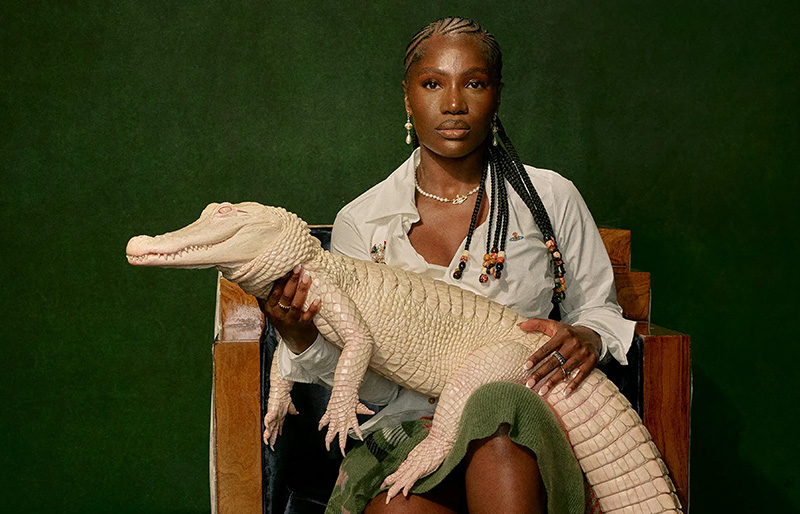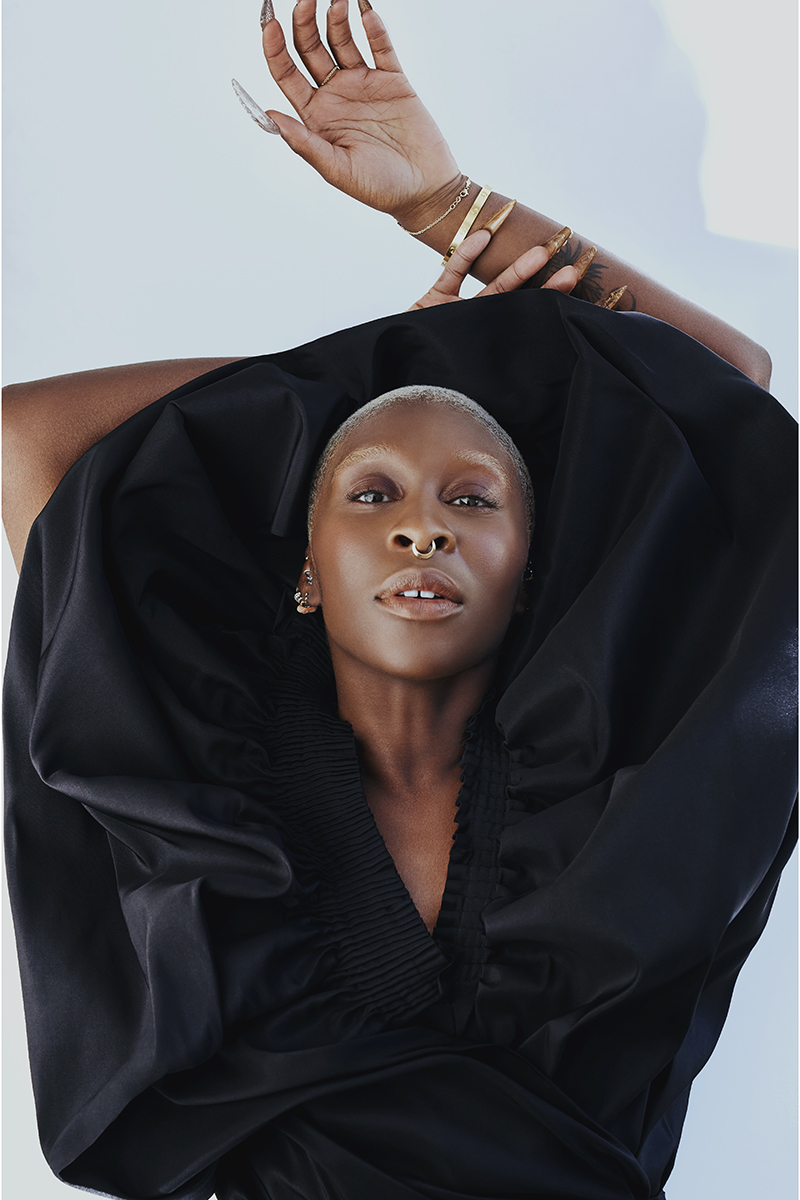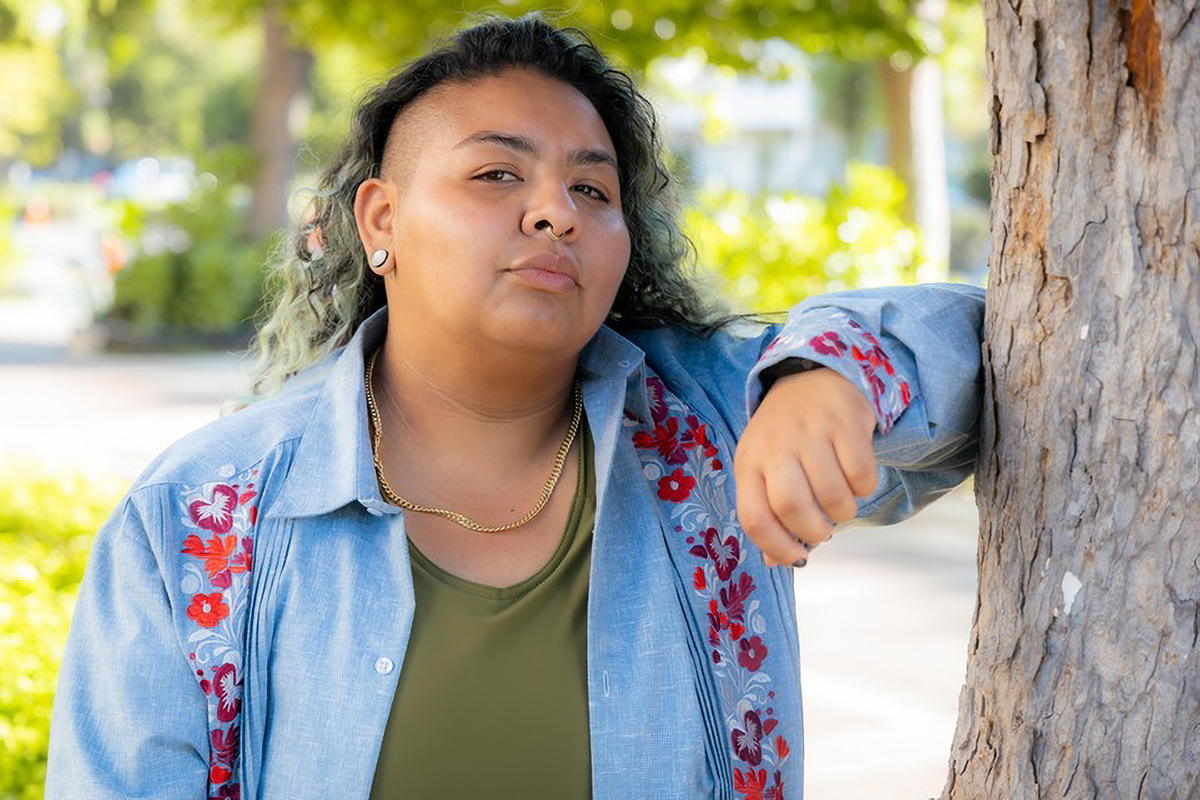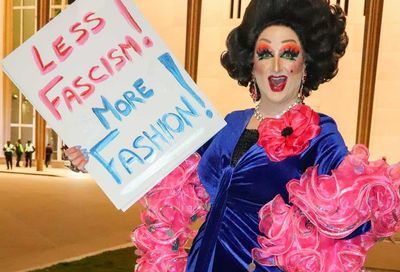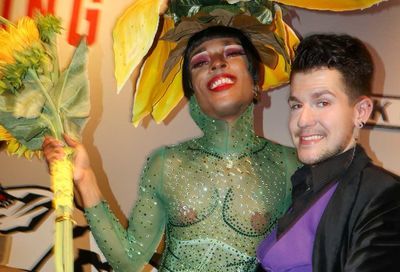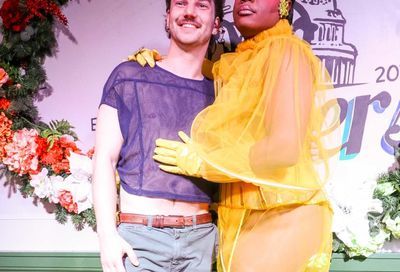Hard News
Former Blade Publisher Don Michaels
When A&P groceries transferred Don Michaels to Buffalo, New York in 1968, it was an unlikely link in a chain of events that made the Washington Blade one of the nation’s most respected gay newspapers.
But it was in Buffalo that Michaels first became involved with gay activism. It was in Buffalo that he met his lover of 28 years, John Yanson, with whom he would move to Washington in 1976. And it was in Buffalo that he edited a small gay newsletter, an experience that in 1977 would spur his involvement with the Blade.
After becoming the Blade‘s first paid staff member, Michaels later became the publisher, overseeing the paper’s growth from a monthly, volunteer-produced newsletter to a weekly, professionally-staffed newspaper. In 2001, after twenty-four years at the helm, Michaels decided to retire, selling the Blade to Window Media.
Sitting in his D.C. home where he spends much of his time plastering walls and repairing mortar, his deep and somewhat scratchy voice coupled with his tall frame make him seem less a retired gay newspaper publisher and more a working housing contractor — a description that Michaels appears to welcome.
“I enjoy being hands on, working on this house, ” he says. “I like to have a direct effect on what I’m doing. ”
It’s that attitude, perhaps, that drove Michaels and his Blade staff to make the paper a venue for hard news, creating a newspaper of record for the gay community. And it’s that achievement for which he will receive a 2002 Distinguished Service Award from the Gay and Lesbian Activists Alliance.
Throughout his career with the Blade, Michaels maintained a low profile as publisher, feeling that an activist role on his part would interfere with the paper’s role as an objective recorder and observer of the community. Now in retirement for over a year, Michaels looks back at the history of Blade, the philosophy that guided it and why hard news matters for the community.
MW: What have you been doing since you left the Blade?
Don Michaels: Relaxing more than I intended to. It’s fun, not having to show up to work every day. I’ve been working on this house — a fixer-upper that I bought ten years ago and thought I’d be done by now. Now that I have a lot more time to work on it, I’m starting to make some progress.
MW: So you do most of the work yourself?
Michaels: I’ve done just about everything myself except for putting a new roof on, and things like major plumbing and electrical stuff.
MW: When you finish with the house, what are you going to do?
Michaels: That’ll depend what’s happening when I get it finished. I think I’d like to leave Washington.
MW: Really? For any particular place?
Michaels: San Diego, California. I’ve got this love affair going with San Diego. The weather is consistently nice, and it’s laid back. As the locals call it, it’s paradise.
MW: Does John like San Diego, too?
Michaels: Yes.
MW: How long have you been together?
Michaels: We met 28 years ago this month, in Buffalo, New York. We started living together in December of 1974.
MW: What were you doing in Buffalo at the time?
Michaels: When I met John I was a full time gay activist. I had been working for the A&P grocery chain as a buyer. They transferred me to Buffalo in 1968, which is where I came out of the closet. I left A&P to go finish my degree work at the University of Buffalo. I took a political science course from Jim Zais, and it turned out we had a mutual friend in the community who told him that I was gay. We got together socially a few times, and he recruited me [politically]. I got hooked on gay politics — not partisan politics, but gay liberation. Today it’s politics, then it was liberation.
I wound up doing crazy things like driving down to Miami in ’72 to attend the Democratic convention. There was a big camp full of gay people lobbying for [George] McGovern to endorse the gay rights plank at the convention, which he did not do. That got me radicalized to a point. Shortly thereafter, we set up a gay community center in Buffalo. I ran that until 1976, when John and I moved to Washington. We originally were planning to go to San Francisco, but we decided we wanted to be closer to our families in the Northeast. And we thought Washington would have better opportunities for making a living.
MW: How did you first get involved with the Blade?
Michaels: When we got here, I was still radicalized enough that I put on my resume that I’d worked in gay politics in Buffalo. This was 1976, and everywhere I sent my resume that was a roadblock. Then Jim Zais introduced me to Lou Chibbaro at a GAA [now GLAA] meeting. When Lou found out that I had edited and written for a gay rag in Buffalo, he suggested that I come to a monthly writers’ meeting for the Blade. There were no paid staffers at the time.
So I went to the January 1977 Blade writers’ meeting. If you’ve ever been involved in gay politics, particularly in the old days, if you showed up for a meeting you didn’t leave without something to do. The folks running the Blade at the time prevailed upon me to deliver papers in my beat-up old Volkswagen bus. And I wrote some articles — I think my first articles appeared in the February 1977 edition. Eventually the paper’s board of directors voted to hire a staff person for the office for $300 a month, so I volunteered to do that until I found a full-time job. And I just made a full-time job out of it. I really got into it. Advertisers who called actually had someone to talk to. The paper began to grow. We hired another person, and as the paper grew, we kept hiring more people to do stuff. That’s how it evolved. We went biweekly in 1978, and weekly in 1982.
MW: You said you had worked on a newsletter in Buffalo. Did you have any journalism background?
Michaels: I didn’t. My degree is in political science. It’s like having a degree in English. “You can do anything, ” is the polite way of saying it.
MW: They say the same about journalism degrees.
Michaels: I guess you have to go for masters these days in journalism.
MW: My professors told me to skip the masters and just get a job — I’d learn more. It think three-quarters of the people in my class wanted to go into advertising.
Michaels: In all my years with the Blade, that’s the one area of the business that I didn’t…I shouldn’t say didn’t care much for because that’s how we earned our living. But I was much more interested in the editorial end and, after the Blade grew, I really enjoyed the management end of it.
MW: What did you not like about the advertising end of the paper?
Michaels: The little bit of political part of me that still remains thinks that people should just plain be willing to support a good gay publication for the sake of it. That’s unrealistic, I know, but that’s my attitude. That’s not a good attitude to carry into an establishment when you’re trying to sell them advertising.
MW: After being there for so long, what do you miss the most about the Blade?
Michaels: I miss a lot of the people there. I thought we had a good staff of hard-working, decent people. I enjoyed the camaraderie of working with them. A lot of them worked harder than I did — they were really into it. In the old days I worked seventy or eighty hours a week, every day of the week, and I felt that a number of people that were at the Blade when I left had that kind of commitment. Obviously, with the Blade at that size we didn’t have to have people working eighty or ninety hours a week, but a number of people, particularly the ones in positions of responsibility, gave more effort than would be required otherwise. I like that spirit in somebody. So I miss that. But twenty-four years is a long time, and I think leaving was overdue for myself.
MW: What do you miss the least?
Michaels: The problems over which I had no control. Like a really good employee says, “I’m going to move to San Diego. ” [Laughs.] Those kinds of problems. The public relations work that it took to soothe hurt feelings and stuff like that. I can do it, but it’s not something that I care to do on a steady diet. Those kind of things I don’t miss. I enjoy being hands on, working on this house, or I have an old car out back and I enjoy working with it. I like to have a direct effect on what I’m doing that doesn’t get retranslated by an intermediary. If I tighten the bolt on the engine block and the block cracks, I’m the idiot. But if I tune up the carburetor and it purrs like a kitten, I did that, too. That kind of thing I enjoy. But when I got involved with the Blade, I never envisioned it getting as big and corporate as it did.
MW: Was it a goal of yours grow the paper much bigger?
Michaels: It was a goal of mine to record what was going on in the community and concerning the community. To be a newspaper of record was the main thing that I was interested in, as were the folks running it when I came along. They were all volunteers devoting their evenings and weekends to the Blade, but they had that goal. That appealed to me, which is why I stayed around while they were running it.
MW: My impression has always been that you didn’t like to take a real public role.
Michaels: I didn’t. I don’t have any psychological analysis of that, it’s just something I didn’t like to do. I wanted to make the paper good, and make sure that its role was what got attention. I’ve seen an awful lot of publishers of gay publications and other types of weeklies become the focal point, where their role as an active player in the community becomes more important than the paper. If you’re striving to be a good newspaper of record, recording events in as unbiased a way as possible, you shouldn’t have some large ego at the helm being a lightening rod. That’s behind why we didn’t do Blade-generated editorials. I wanted people to read our news articles without feeling as though the editorial I wrote the week before colored the perceptions of the reporter writing the news article. In D.C. there are so many activist organizations and people with opinions that I didn’t think it was necessary for a newspaper to try to lead by writing editorials. I still think it’s not a good path to take. I don’t see how the editor makes the decisions about what the reporters cover and how it gets edited, if that same editor is writing editorials that are vehemently in favor of or opposed to something. Obviously, the new owners feel differently, and I knew that ahead of time. And that’s common — most newspapers write editorials.
MW: You mentioned a number of times how you wanted the Blade to be a newspaper of record as a service to the community. At least on the surface it seems that community service and objectivity don’t necessarily go hand-in-hand.
Michaels: I think it does. The Blade had the largest weekly calendar of events of any gay newspaper in the country, except maybe the Advocate. The Metro Notes column reported smaller news items that didn’t have the impact of some of the larger front page stories. And we ran a little digest of what were essentially the minutes of group meetings that had occurred. Those are as much a matter of record as a story about the latest AIDS drug breakthrough. That’s what I mean by newspaper of record. Historians a hundred years from now can look back and see all these things going on. They’ll look through these articles and get a perspective.
MW: What type of judgment would you like a historian to make about the Blade as a newspaper?
Michaels: That it was a damn good one. That it came real close to fulfilling its objective every week. I can’t say it was perfect. We would constantly be reminded of something we missed. That’s another thing that I like about D.C. There aren’t too many shy people here. People would let us know when we missed something, and if they weren’t being frivolous, if there was something serious that we missed that deserved to be corrected, we had the corrections box every week on page five.
MW: I know that among some groups within the gay community, the black gay community for example, there has been a feeling that the Blade did not include or cover them appropriately.
Michaels: From the day I set foot in the Blade I heard that. We missed a lot of things, but it wasn’t for lack of trying. Often folks who were complaining were also overworked with what they were doing and wouldn’t think to call us ahead of time. I discovered, too, that [some groups] did not want the Blade to attend a meeting they were having. They wanted us to sit passively by and wait for them to call us up and tell us their version of what happened. They didn’t want to be seen as having any divisive voices. We would try to explain, “This is a newspaper, we want to be able to tell the community what’s going on. If you want hard news coverage, you have to let our trained reporters in there to report warts and all. ” Often activists in particular don’t want that. They want to manage the news.
MW: Looking back at your time with the Blade, what would you do differently?
Michaels: I wouldn’t do less hard news. I don’t think we ever did too much hard news. A lot of people disagree with that because they don’t want to read hard news. If they don’t want to read hard news, that’s their choice. But hard news is a very essential part of being a newspaper of record.
We probably could have done more for gay businesses, doing articles when they first opened and that kind of thing. But we were very gun shy about that. We didn’t want to be seen as a paper that ran an article about business and then had that business’s full-page ad appear in the same issue. We felt that that would raise questions about our integrity. Maybe we were a little too anal about that issue, because business has become an extremely important part of the development of the community in the last decade or so.
MW: What’s something you look back and say, “I got that right? “
Michaels: Working hard to maintain the integrity of the paper — not just the editorial, but its business end as well. There are advertisers who will disagree, but we worked hard to maintain our integrity vis-Ã -vis the editorial product and the advertising issues. A lot of advertisers didn’t like it, but we took the time to sit down and explain to them where we were coming from.
We worked hard to try to reflect as much of the community as possible. I know we got a lot of criticism from the leather community and the drag community. I think in the leather community we could have and should have done more coverage of the good charitable things they did for the community. But a lot of what they wanted us to do was more social in nature, and the Blade’s strong suit was not doing social life. We always felt there would be a role for a publication like MW — we kind of felt the pressure on us was relieved with other publications in town. We were a hard news organization, that was our first love and I think that built our reputation. So we really didn’t pay a whole lot of attention to drag events and leather events. If it had a high profile charitable angle to it, we would do it. But often it went by the wayside because our focus was hard news. It was just the way we looked at things.
MW: Was maintaining the division between editorial and advertising something that got easier as you got bigger?
Michaels: There were some businesses that wouldn’t advertise [because] we didn’t write a story about them, but that was the exception rather than the rule. But this is one of the problems we ran into with the New York Blade. Every other weekly publication in New York, I don’t care who it was, not just gay, every little newspaper niche, gave an article to restaurants if [they advertised]. We took our principles that we established here in Washington up to New York and we stuck by them. That hurt us with advertising. We were probably beating ourselves over the head with that one — it just didn’t work very well.
MW: There’ve been lots of rumors and different things about how successful or not successful the New York Blade has been. Is it something you would do again?
Michaels: Probably not. No. We were approached by News Communications, who were the first people that we partnered with up there, and I think, looking back, we went into it a little too soon. I guess we were impressed with their sheer size — we figured if they have this many papers they’ve gotta be doing something right. Well, they weren’t. We clashed culturally. We brought our hard-nosed, hard news approach up there because we felt that’s what gay New Yorkers wanted, but that clashed with [News Communications’] corporate culture, which was a lot more easy going.
The New York Blade was never successful financially. We felt it was appreciated by a lot of people in New York, and our method of doing business was really appreciated. I think if we’d had deeper pockets we could have hung on and eventually turned it around. I thought [current owner] Window Media would do better with it, and I think they are. I haven’t seen a New York Blade in quite some time, but from the reports I’ve got they’re getting more advertising. I don’t know how that translates for them financially. It’s a tough market. It’s such a huge city, you can’t take your assumptions up there.
MW: Over the past few years there have been a lot of gay media mergers. There was PlanetOut and the Advocate and all those coming together. Then you’ve sold the Blade to Window Media, which owns a number of other gay papers. Do you think these are healthy developments, this consolidation of gay media under larger corporations?
Michaels: To a point. There are so many publications now competing for the gay dollar. Up until six or seven years ago a publication like the Washington Blade was in a pretty good position, because if people wanted to reach a fairly wide [gay] audience, they went to the Blade. But then everybody was getting into the act — and not just gay publications. There are other publications claiming gay readership: “You can reach ’em all in our publication, you don’t have to go to a gay publication because you won’t reach the straights there, ” that kind of stuff. And it looks to me like national ads for local gay publications are drying up right now. That’s probably for a couple of reasons, not the least of which is that AIDS drugs have made treatment more of a maintenance thing these days, and so they’re not putting as much money into the AIDS drug [ads] that they used to.
But also a lot of these ad agencies like to go in slick publications — they don’t like newsprint. I’d like to have a dollar for every ad agency that’s said, “Oh, we don’t do newsprint. ” That’s more important to them than whether they’re reaching a good audience. But you’ve gotta face that reality, so consolidating to save on overhead or spread expenses over several publications makes sense. But as with anything else, if you don’t do it right, it doesn’t work. To me that has always been the key to a lot of business success: if you work hard and do more right than you do wrong, you’re going to be successful. I don’t think people should look at a consolidation and react with fear like it’s the end of all independent gay publications. It doesn’t have to be. Yes, it could be. But it doesn’t have to be. It comes back to the same old story, it depends on the people running it.
MW: Is there a risk of narrowing what was once a lot of different perspectives from a lot of different organizations into fewer viewpoints, or fewer choices of coverage?
Michaels: When I see a byline from Atlanta, say, for the Southern Voice, and it’s a news article, I think that leaves a writer here in Washington free to do another news story that can get in the paper. You talk about viewpoints — that news article should not be somebody’s viewpoint. If you have a trained news reporter doing it, and it gets in four other publications, that means there’s a wider audience getting the benefit of that story. Now, if what you’re talking about is if they crowd out other news stories that might otherwise have been done — then yes, that takes away from the effectiveness. But if all you’re talking about is making sure that a particular news story has a wider audience, then I think that’s good.
Again, it comes back to people who make the decisions and the decisions they make. You can’t just attack the mechanism as being evil because it doesn’t have to be. It’s who has got their hands on the lever. If a story on something major happening at the Human Rights Campaign [HRC] can be done by a reporter in Washington, while a reporter at the Southern Voice is doing something crucial for local news in Atlanta, that’s good. At least the story about HRC is going to get in Southern Voice, the New York Blade and the Washington Blade. That to me is good. But if you just fire half of your staff and have one person writing three news stories because that’s all they can handle every week, then that’s not good. So with these sort of off-the-cuff criticisms about consolidation, you have to wait and see how the people doing it live up to their responsibilities.
MW: How does it feel to look at the Blade now, with it visually so different, and with the staff different?
Michaels: It’s not as painful as I thought it would be. I do what anybody would do — I look at it and think, “I wouldn’t have done that. ” But I don’t think anybody who’s owned or who’s run something for as long as I did is going to look at it and say, “Oh, this is so much better than anything I could do! ” I wouldn’t have all those columnists in it. The Washington Blade when I was there was unique in that sense, I guess we were probably the only gay paper in the country that did not do editorials and that sort of thing. And if I had it to do over again, I would still do that. I see design things that I wouldn’t have done, but they’re not offensive. The new design is kind of neat in a lot of ways. I don’t think I would have paid a design consultant, however, to do it. I would have found someone who would give some advice for free. [Laughs.] I mean, come on, there’s only so many things design-wise you can do to a tabloid. You’re limited. And so I hope they didn’t pay the guy too much.
MW: Do you have any regrets about selling the Blade?
Michaels: For myself, no. Like I said, it was overdue. It really was, to make a change. I really love plastering a wall as opposed to soothing somebody’s feelings or ego or, you know, making sure the bottom line has a plus sign in front of it instead of a minus sign. Personally, at the age of sixty, it feels good to be able to get away and go back to things I feel most comfortable with.
MW: Is there any chance if you move to San Diego that you might get involved with newspapers again?
Michaels: No. But if I got involved with a newspaper again, it would be something beach-oriented — what’s the latest swimwear, or what’s the temperature in the water today, that kind of stuff. [Laughs.] And I’m sure I’d still get in trouble with advertisers or people in the community who wanted us to write an article about their section of the beach. You can never get away from that sort of stuff.
Support Metro Weekly’s Journalism
These are challenging times for news organizations. And yet it’s crucial we stay active and provide vital resources and information to both our local readers and the world. So won’t you please take a moment and consider supporting Metro Weekly with a membership? For as little as $5 a month, you can help ensure Metro Weekly magazine and MetroWeekly.com remain free, viable resources as we provide the best, most diverse, culturally-resonant LGBTQ coverage in both the D.C. region and around the world. Memberships come with exclusive perks and discounts, your own personal digital delivery of each week’s magazine (and an archive), access to our Member's Lounge when it launches this fall, and exclusive members-only items like Metro Weekly Membership Mugs and Tote Bags! Check out all our membership levels here and please join us today!




